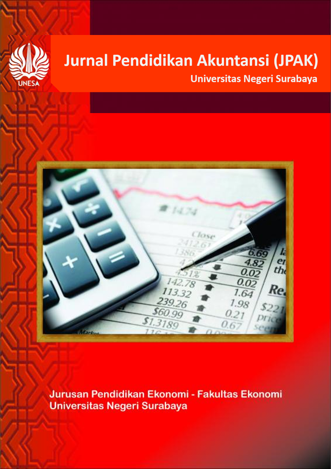Pengembangan Bahan Ajar E-Book Berbasis Kontekstual Pada Mata Pelajaran Praktikum Akuntansi Lembaga Kelas XI SMK
DOI:
https://doi.org/10.26740/jpak.v8n2.p63-74Keywords:
E-books; contextual based; accounting practiceAbstract
The increasingly rapid and modern development of science and technology brings a new paradigm in human life in all aspects. The educional world does not desert from the use of technology in the learning process. Along with curriculum charges occurs in Indonesia, which are in line with the development of learning tools, namely one of the teaching materials. The aim of this development research is to make the available e-books more perfect by developing electronic teaching materials based on a contextual approach for class XI SMK second semester accounting practicum subjects/government agencies. The 4D model was chosen by the researchers because this model was systematically arranged to solve problems in learning and adapted to the needs of students. The researcher only carried out the stages of determining, designing, and developing because the researcher focused on producing contextual-based learning materials, testing the feasibility of the book to be used in the learning process. To be carried out, a study and trial was carried out by three experts from various majors and a trial was carried out on 20 students. Based on these results, the criteria were "very feasible" to be used and students were able to understand the material presented.
Downloads
Downloads
Published
How to Cite
Issue
Section
License
Authors who publish with this journal agree to the following terms:
- Authors retain copyright and grant the journal right of first publication with the work simultaneously licensed under a Creative Commons Attribution License that allows others to share the work with an acknowledgement of the work's authorship and initial publication in this journal.
- Authors are able to enter into separate, additional contractual arrangements for the non-exclusive distribution of the journal's published version of the work (e.g., post it to an institutional repository or publish it in a book), with an acknowledgement of its initial publication in this journal.
- Authors are permitted and encouraged to post their work online (e.g., in institutional repositories or on their website) prior to and during the submission process, as it can lead to productive exchanges, as well as earlier and greater citation of published work (See The Effect of Open Access).

Jurnal Pendidikan Akuntansi (JPAK) is licensed under a Creative Commons Attribution-NonCommercial 4.0 International License.
 Abstract views: 404
,
Abstract views: 404
, PDF Downloads: 377
PDF Downloads: 377



